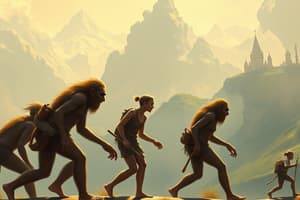Podcast
Questions and Answers
What does the term 'Homo faber' refer to?
What does the term 'Homo faber' refer to?
Human as worker, the idea that work makes us human.
What does 'Homo ludens' mean?
What does 'Homo ludens' mean?
Human as player, the idea that play makes us human.
Define 'work' in the context of the content.
Define 'work' in the context of the content.
The expenditure of effort and use of energy to produce something.
What percentage of Americans would choose a different career if they could, according to a 2012 survey?
What percentage of Americans would choose a different career if they could, according to a 2012 survey?
What does the term 'current turnover rate' refer to?
What does the term 'current turnover rate' refer to?
List two tangible symptoms of work dissatisfaction.
List two tangible symptoms of work dissatisfaction.
What is workaholism?
What is workaholism?
Define 'downshifting'.
Define 'downshifting'.
What is the 'standard of living'?
What is the 'standard of living'?
What was John Maynard Keynes' view on wealth?
What was John Maynard Keynes' view on wealth?
What does 'conspicuous consumption' mean in Veblen's context?
What does 'conspicuous consumption' mean in Veblen's context?
What is the economic impact of national parks?
What is the economic impact of national parks?
How does consumerism affect leisure?
How does consumerism affect leisure?
What are knowledge workers attracted to?
What are knowledge workers attracted to?
How do affluent retirees influence parks and open spaces?
How do affluent retirees influence parks and open spaces?
Flashcards are hidden until you start studying
Study Notes
Concepts of Humanity and Work
- Homo faber: Defines humans as workers; emphasizes creativity and control through labor.
- Homo ludens: Defines humans as players; highlights the significance of play in human identity.
Nature of Work
- Work entails the effort and energy expended to produce results; productivity has doubled over the last 60 years.
- Nearly 60% of individuals wish to change their careers; work is often perceived as boring and stressful.
Work Satisfaction Statistics
- 2015 Gallup Survey: Only 57% satisfied with vacation time; 33% happy with earnings; 54% with immediate supervisors; 45% feel recognized for achievements.
- 2012 Survey: 60% of 26,000 Americans would choose a different career despite 80% planning to delay retirement until age 71.
Job Market Insights
- Current turnover rate stands at 2%, slightly lower than 2.5% a decade ago.
- Job dissatisfaction manifest through tangible (tardiness, apathy) and intangible (anxiety, depression) symptoms.
Perspectives on Work and Leisure
- Pro-leisure Perspective: Views leisure as essential for balancing the negative effects of work.
- Pro-work Perspective: Considers work as a fundamental human state, with leisure merely serving to enhance productivity.
Workaholism and Play-aversion
- Workaholism: Defined as an unhealthy addiction to work, differing from being a diligent worker.
- Play-aversion: Describes applying work-related behaviors to leisure time, diminishing enjoyment.
Life Choices and Economic Perspectives
- Downshifting: Refers to voluntarily reducing career demands in favor of more fulfilling, stress-free lifestyles.
- Standard of Living: Gauges economic prosperity via income, housing quality, medical care, and education opportunities.
Economic Theories and Impacts
- GDP (Gross Domestic Product): Measures the value of produced goods and services; global GDP reached $73 trillion in 2016.
- Keynes: Advocated that wealth should serve leisure needs; growth estimate at 2%.
- Veblen's View: Identified leisure as a status symbol; linked wealth and privilege.
Economic Systems and Consumerism
- Capitalism: Based on private ownership with free-market principles aimed at profit realization.
- Consumerism: Focuses on excessive consumption, often fueled by media influences; leisure consumption increased from 2% in the 1800s to 9% by 2008.
Leisure's Economic Significance
- Leisure can stimulate economies through employment, business attraction, crime reduction, and increased property values.
- National parks generate significant tourism-related income; for instance, Arches and Canyonlands generated $30 million from 1 million visitors.
Leisure and Satisfaction
- Leisure Satisfaction Factors: Intrinsically motivated activities, perceived freedom, optimal challenge levels, and enjoyable company contribute to overall life quality.
- Coping Strategies for Job Dissatisfaction: Financial emphasis and engaging in rewarding activities during free time.
Economic Development and Trends
- Developed economies enjoy higher discretionary income and leisure service availability compared to developing regions.
- Both community quality and recreational opportunities attract knowledge workers and homebuyers.
Conclusion on Leisure's Role
- Leisure reflects a nation's economic health and can significantly influence consumption patterns. Balancing work and leisure impacts overall quality of life and satisfaction.
Studying That Suits You
Use AI to generate personalized quizzes and flashcards to suit your learning preferences.





